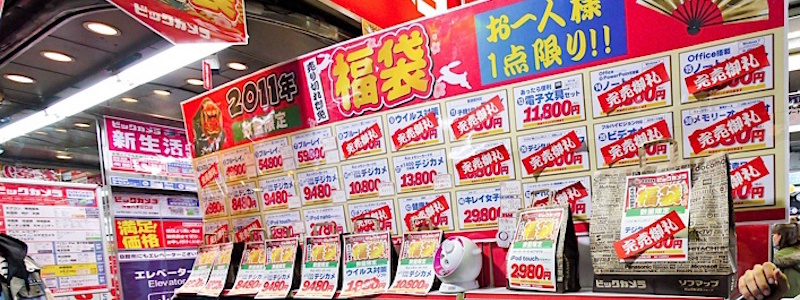Along with hotels and restaurants, shops in Japan pride themselves on their high standard of customer service. The shopping experience is generally a straightforward one, but there are a few customs and peculiarities you should be aware of in advance.
Table of Contents
Greetings
Shop staff will almost always greet customers with a cry of “Irasshaimase” (いらっしゃいませ) when you enter, or as they pass you in the store. It is not necessary or usual to say anything in response to this. On completing your transaction at the check-out or on leaving the store, it is common to hear staff say, “Mata okoshi kudasaimase” (またお越しくださいませ), meaning “Please come again.”
Tax
The consumption tax rate for goods and services in Japan is was 8% but starting from October 2019 it has gone up to 10%. Some shops will display the price before tax prominently, while others will show the price with tax included. Take care to check the price display, as both prices will often be featured. The tax will typically be displayed separately on your receipt.
Duty-free shopping is available to visitors to Japan at a number of shops selling a wide variety of goods. Your passport is required at the checkout, and only those staying in Japan for less than 6 months are eligible.
See also: list of tax-free shopsPayment
Japan is well-known for being a cash-based society. While this is still the case, the use of credit and debit cards is becoming more widespread. When using cash, it is common to place notes and coins in a plastic tray at the register, rather than directly into the hands of the cashier, though change is usually handed over directly.
Services
- Gift wrapping: some stores will offer often gift wrap items for you with or without extra charge depending on the store and the type of wrapping.
- Rain covers: most department stores offer rain covers for your shopping bags (paper bags) at no extra cost on rainy days.
- Ice packs: some supermarkets, department stores and other food vendors offer ice packs for meat, fish and dairy products. At department stores they provide reusable ice packs with your groceries. Local supermarkets have ice boxes with bags of ice cubes, or where you can fill a bag by yourself. Some stores have dry ice, too. Many places offer these for free, however, some places charge a small fee.
(Notice)
Plastic shopping bags were free for long time, but they are charged since July 1, 2020 (as part of the environmental movement). One shopping bag is charged minimum 1 yen, price depends on its size and shops. Cashier normally asks you if you need a bag. You can answer “Fukuro wo kudasai” if necessary, “Fukuro wa irimasen” if unnecessary. You better bring reusable shopping bags with you.
Sale Seasons
Major sales take place in early summer and in winter at the beginning of the New Year, although many shopping complexes are starting to hold seasonal clearance sales more often, and for longer periods. Fashion and clothing sales typically take place in spring (April-May), summer (June-July) and winter (December-January). Home appliance retailers usually hold sales in March, and in summer (June-July) and winter (December-January). At New Year, department stores sell fukubukuro (福袋, lucky bags), containing a mystery selection of products at a greatly reduced price. Many people arrive early and form lines outside of the department stores to get their hands on them.
